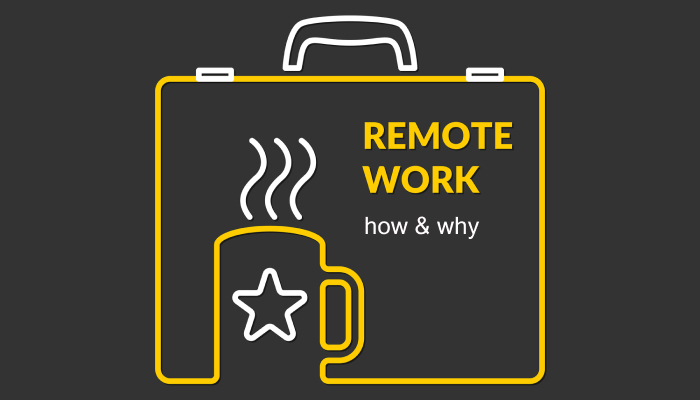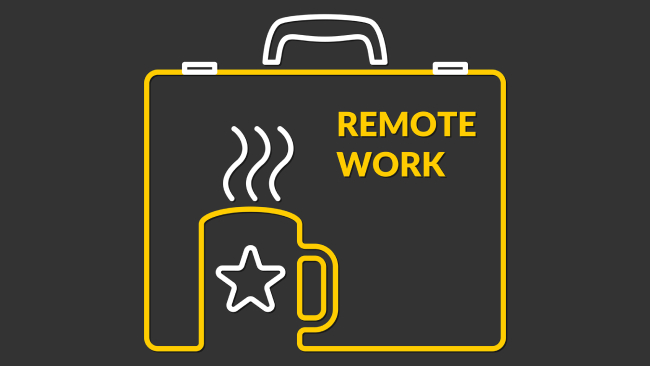
If you’ve thought of switching to remote work, then right now is the best timing. A lot of people switch to remote work and never look back. However, it’s not always that simple. First off, you might have a good job already, which you love and can’t really do without. Second of all, you’re really hesitant to switch to freelance lest you lose the health care benefits or some other cool perks associated with office work. All of these fears are pretty reasonable and substantiated.
However, on the other hand, you might be surrounded by different circumstances, like being really tired of the office environment, preparing yourself for the magical addition to your ever-growing family, battling a mental health issue, or whatever the reasons – sometimes the only solution is to switch to remote work from home.

In this piece, we’ll take a look at some of the strategies you can adopt to negotiate and prepare yourself for a smooth transitioning from the realms of the office cubicle space to the comfort and warmness of your own apartment.
What are the pitfalls of remote work?
Remote work from home obviously has its own set of disadvantages, including a lack of community and, as a result, communication. Freelancing makes it much harder to build camaraderie, develop a teamwork spirit, and actually feel like a part of a bigger team. If feeling present is not something that might concern you at this very moment, then the lack of communication can have long-term effects on your wellbeing including potential mental health issues.
Because of a lack of proper communication, it’s often extremely hard to present the results of some of the intangible work that you might be doing and showcase your achievements.
One of the other disadvantages is decreased work-life balance, which might sound a bit surprising, but, in fact, remote workers often complain about the impossibility or difficulty of switching off after work. It’s quite hard to unplug and focus on something else after work since you have not gone anywhere but stayed in the same place.
On the other hand, freelancing is a commitment, and it’s of utmost importance to manage your distractions and cut them down to an absolute minimum.
How to ask for remote work?

Before you even consider asking to switch to remote work, it’s best to work on your detailed plan of action.
First of all, gather data: think over your case and collect some hard-wired facts that would be difficult to refute and easy to consider and accept. Think of any other people (preferably at your own company) who have already benefited from working remotely and has shown outstanding results with transitioning. You can use those people as perfect examples why you can possibly achieve these same results or better. However, if someone in your company has tried but failed to work remotely, you can elaborate on why your case is different and why you can definitely make it work.
Ask your co-workers or a mentor for a recommendation, which might help you get your superior’s approval. Your supporting co-worker might point out the specific results you have already achieved and vouch for your productivity and discipline. If there’s been an example of a day or a week where you worked remotely, ask your co-worker to describe the experience and attest that you can be trusted with self-organization.
Prepare a list of terms of what you need and what exactly you’re asking for, including your salary expectations (if they are about to change with transitioning), the hours you’re able to commit, the circumstances that surround your decision, what you can offer in return for flexibility, and any other details you deem necessary. Actually, it’s better to have Plan A, B, and possibly C: think of many scenarios of how to transition and how to incorporate more flexibility.
A couple of suggested scenarios:
- You ask your boss for a trial remote work period, work your hardest (but not more than you’d actually be able to work after the trial period ends).
- Ask for part-time remote work, that is: you work from home early in the morning avoiding the rush hour and be your best productive self and then show up at the office in the afternoon. Otherwise, work early morning in the office, and go home after lunch and work from home in the evenings.
- Ask for remote days: you work Mon-Wed in the office, Thur-Frid at home.
You can actually come up with many other creative scenarios to convince your boss.
Consider possible arguments or concerns that your boss may raise and come up with contra-arguments that would distill your manager’s worries.
After you’ve gathered all possible data to confirm your commitment and made a list of terms that you can offer and expect back from your boss, it’s time for a face-to-face conversation.

Instead of messaging your superior on Slack or pinging them on Twitter or calling on the phone or sending an email — say you’ll require a personal meeting because you need to discuss something important.
During the conversation, don’t bog your boss with any of the personal details, instead — go straight ahead and say that the reason for the meeting was because you wanted to discuss the possibility of switching to remote work or, otherwise, incorporate some flexibility into your existing schedule.
Instead of making your boss think for you, provide the plan and recommendations from others that you’ve developed earlier. Spill it out and ensure you’re well-prepared. Also, shoot different scenarios you’ve come up with while preparing, and let your boss decide which scenario is ideal.
While being at it, promise to work hard. Oftentimes, remote work is associated with unpredictability and slacked-off lifestyle, so it’s important to let your boss know exactly how hard you’re going to work and what an excellent setup you have at home to make you a better worker. Be specific about how your increased flexibility is going to benefit your boss and the productivity of your team. Get research handy that will show your boss some undisputable statistics linking remote work to increased productivity, moreover — make it applicable to your specific case.
When to ask for remote work?

It’s ultimately a bad idea to ask for remote work when you’re a newcomer. Stay at your job in the office for a while and ensure you get your hands on the job, get used to your boss and let your boss get used to you.
It also doesn’t seem viable to ask for a job from home if you’re an underperformer. You boss needs to trust you and your judgment, this way, the chances you land a flexible schedule are really high. Before you think of asking for a telecommuting job, consider the following questions:
- How have your past performance reviews gone?
- Is there any positive feedback you received from colleagues and your superior?
- How’s your rapport with co-workers and clients?
Ask for remote work opportunities only if your past performance reviews, feedback, and rapport with your colleagues and coworkers are all extremely positive and can be counted on while making an argument for the possibility of remote work from home.
Conclusion
Asking for remote work is hard. It’s much harder, though, if you don’t even ask. If your circumstances put you in a position of considering remote work, it’s better to act upon that possibility rather than stay stressed in the office, because you can’t care for someone or something waiting for you at home. Remote work comes with a lot of disadvantages, hardships, and even struggles. But even then, it might be a much better choice than office work.






